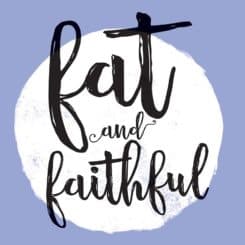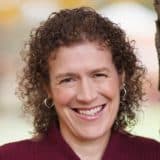 Editor’s Note: As 2018 draws to a close, we are posting CSA staff selections of the most memorable articles of this year. Today’s selection was chosen by Kristyn Komarnicki, Director of Dialogue and Convening for CSA.
Editor’s Note: As 2018 draws to a close, we are posting CSA staff selections of the most memorable articles of this year. Today’s selection was chosen by Kristyn Komarnicki, Director of Dialogue and Convening for CSA.
Kristyn writes: “J. Nicole Morgan’s is a voice the church needs to hear—authentic, brave, clear, and loving. Even as she calls out thin privilege and the fat-shaming nastiness that too often passes as humor, Morgan is more focused on inviting all bodies of all sizes into faithful, empowering fellowship. I’m so grateful for her work!”
When Paige Patterson made a “comeback sermon” last month at a church revival in Alabama, he chose to include body-shaming as a way to bring his listeners to Jesus. Patterson had been fired months earlier from his post as president of the Southern Baptist Theological Seminary, because of misogynistic comments and mishandling of sexual assault charges at his institution; and yet here he was, poking fun at women’s bodies—in particular, of a fat woman who, Patterson said, would flood a baptistery, given her body size. His jokes at her expense caused uproariously laughter from the revival crowd.
Patterson’s shtick came as no surprise to J. Nicole Morgan, who has heard countless sermon examples—and similar mockery from the pulpit—about people who are fat. Morgan herself has been fat for much of her life. She uses the term “fat” unflinchingly, believing the word is merely an adjective, a descriptor of her body and its size. In her excellent new book, Fat and Faithful: Learning to Love Our Bodies, Our Neighbors, and Ourselves, Morgan narrates the journey she’s taken toward acceptance of who she is, as a fat woman living in a culture that too often sees thinness as a godly standard to which we should all aspire.
Morgan joins a increasingly vocal subset of researchers and writers who are challenging deeply-held cultural assumptions about body size. A recent and widely-shared Huffington Post article, “Everything You Know About Obesity is Wrong,” unpacks the many mythologies we carry about health and weight: arguing that people who are fat sometimes receive cruel treatment from the medical community, are misidentified as lazy gluttons, and thus carry a burden of shame about who they are and what they can do. The article’s author concludes that despite the many cultural biases against fatness—or perhaps because of those biases—people need to learn how to accept their bodies in a “revolutionary act of being happy and fat in a world that tells you that’s impossible.”
Morgan joins a increasingly vocal subset of researchers and writers who are challenging deeply-held cultural assumptions about body size.
Morgan’s Fat and Faithful reaches a similar conclusion, offering a thoughtful, biblically-based response to those cultural myths about fatness. Morgan’s Christian faith informs her body-positive ethic, one which acknowledges that we are all created in God’s image, no matter our shape or size. This understanding of the Imago Dei is at the heart of Fat and Faithful, as is Morgan’s insistence that scripture supports acceptance of our physical selves as whole and holy, just as they are. She also challenges those in Christian leadership to build more fat-positive communities, making physical spaces more accessible for people who are fat, and being intentionally inclusive by using body-positive language in sermons and publication.
Morgan, who has a master of theological studies degree from Palmer Seminary, recently spoke with me about her faith, about fat acceptance, about diet devotionals, and about how the Bible offers a redemptive understanding of food and feasting that Christians of any size can embrace and celebrate.
What’s the significance of using the term fat—a term often seen as derogatory—in your book’s title and in its content? Do you feel that word will alienate some readers?
I use that very intentionally as a way to reclaim this word. It’s just an adjective, and it’s a true word about my body and the bodies of many others. My gut instinct is that the word is more alienating to people who are afraid of being fat than people who are fat. It’s almost freeing to be able see that truth and to say, “Yes, that is my reality; it is a part of what describes my body.” Some people may be offended by the word, but in terms of it being a true word or true statement, the word fat is still worth using.
Can you talk about where your passion for body positivity and fat acceptance comes from?
I stumbled into body positivity and fat acceptance when I was in college, and the more and more I learned, the more I was able to figure out who I was. When I wasn’t distracted by trying to lose weight and when it wasn’t my main focus in life, I had more space to figure out who God created me to be and to figure out what my passions were.
When I wasn’t distracted by trying to lose weight and when it wasn’t my main focus in life, I had more space to figure out who God created me to be and to figure out what my passions were.
I want to offer this freedom to other people, that you don’t have to make your body look a certain way in order to be worthy of love. Your body size is not a determining factor in who you can be as a person. I want other people to hear a different story than what the world tells you, instead of devoting a lot of energy and time to being thin.
In Fat and Faithful, you examine the cultural messages some Christians embrace when it comes to weight. What messages have you found especially damaging in your life as a fat person and a Christian?
From the cultural side, not specific to churches, it’s the damaging lies: that fat people don’t look good. Fat people don’t play sports. Fat people don’t pursue a career in a medical profession because that would be weird. Fat people aren’t going to be actors, because nobody wants to look at that. There’s always rules about things you couldn’t be that I really believed as a kid, and so I never considered a lot of options because I thought they were out of bounds.
Within churches, it is the idea that fat people are somehow quenching the Holy Spirit, and that our bodies are just typical representations of a lack of self-control. And because self-control is a fruit of the spirit, it means that we don’t have a fruit of the spirit, which means maybe we’re not actually Christians. Maybe we can’t produce the self-control that then produces a thin body because we don’t actually have the Holy Spirit in us. A lot of times, those messages occur in casual comments from the pulpit, or in a Bible study, or things that are advertised at church, or a new devotional. Comments like “watch that you don’t become fat and lazy,” or when the pastor is talking about the verse where Peter tells us to run the race, and makes some casual joke like “if you’re going to run the race and you better be fit to do it.” These are just little jokes that everyone thinks are harmless, but when you’re the fat person sitting in the pew, they all add up.
How has scripture been misused to suggest that thinness is a state to which godly people should aspire?
The verses about the body as a temple get brought out, including one in particular, 1 Corinthians 3, where it talks about that we are “God’s Temple.” I’ve heard that used frequently, but if you look at the actual scripture, it’s plural: “you all are God’s Temple.” It’s talking about the church as a whole, not individual people. When scripture says “do not destroy the temple,” it’s addressing the body of believers, not our individual bodies. We so often use that verse to try to shame people into having perfect holy healthy bodies, but we’re actually destroying God’s Temple; through body shame, we are doing the exact opposite of what that verse is calling us to do. People also really like food rules; diet devotional authors pull from scriptures about eating in Leviticus and Genesis. One particular author [of a diet Bible study] uses the Exodus story to compare bondage to being fat, and that fatness is a thing you have to break free from and wander away from, comparing the evil of bondage to fatness and then building an argument from there.
The “seven deadly sins”—and in particular gluttony—have often be used to condemn fat people and to insist that being fat is sinful. How do you interpret this passage? What is your understanding of gluttony within a biblical context?
Gluttony is the consumption of food at the expense of others, especially the marginalized. If you look in the scripture there are a few different stories that deal specifically with gluttony. King Eglon, in Judges, happens to be fat man, and he is an oppressive king: he has wealth and abundance, and his people who live under his rule have nothing and are starving. If you look at the story, you can see that the way he treats other people, not his body size, makes the point about gluttony as a sin.
There are numerous instances in the Bible where people are feasting, consuming a lot of food, and it is good; that’s part of how we honor God: eating together, an essential part of what the early church did. The feasting and the consumption of food together is not gluttony. Consumption at the expense of others is gluttony, because that requires us to think about our neighbor and about our enemies. Thinking about how our choices impact other people and not our waistlines is a lot harder, but loving your neighbor as yourself is an essential part of our faith.
On the positive side, is there a particular story or theological concept in Scripture that underpins your view of the body? What do you believe is the Bible’s redemptive message for those who are fat?
We are, each and every person, made in the image of God. Every single body represents God, and that means that we are all created good. [As an example of this] in the Bible, a woman goes to anoint Jesus’ feet with the jar of oil. When she arrives, all the other men around her are just staring at her, and they can’t believe that Jesus lets this woman touch him. They said her body was unclean, that it was used in sinful ways.
Jesus doesn’t care. The woman anoints his feet with tears, washing his feet and drying his feet, and at this very moment, Jesus accepts the woman, who is living in a body the rest of society has seen as too much and not enough. Jesus says, “Everyone is worthy to worship me.” That is radical welcome. The kingdom of God is an open to every body; our body does not prohibit us from entering into that kingdom, and there’s room at this banquet feast in heaven for everyone. Your body does not prevent you—or create an obstacle for you—to be able to accept that invitation.
Jesus says, “Everyone is worthy to worship me.” That is radical welcome.
You wrote your master’s thesis about Christian diet books and diet devotionals. What accounts for these books’ significant reach? Why are so many Christians, in particular, buying books about dieting?
Part of it is just that people like the idea that there’s some rules they can follow to make themselves thinner. So if there’s a biblical basis for a diet, then they can follow it and check all the boxes, making them feel more holy. The thing that gets me is that it’s just so self-focused; that, to me, is the most dangerous part of it. We get so wound up in our own selves that we have no time for loving our neighbors, and the “get thin for God” idea receives all our energy and resources.
What can churches and Christian organizations do to make their spaces fat-affirming and accessible for those who are fat?
One, look at physical spaces and think about things in your building that have very specific size limitations, like your sanctuary. How sturdy is the furniture? How much space is between the seats? Can people get in and out easily? You’re also going to need a variety of seating options in order to be accessible to a variety of people. Some people need chairs with arms, and some people need chairs without arms. Are the places where you gather, where people sit, and where they enter accessible and open to people in various sizes and abilities? Walk around your building and look. Consider items like choir robes or other common clothing that is shared among people in your organization or church. Think about the sizes of those; make sure that those clothes are inclusive and fit the full range of people in your space.
And then, beyond the physical aspect, consider your words. Churches will have a little note in the bulletin for people who are hard of hearing, directing them to tools to help hear the sermon better; add another note that specifically includes size accommodations. Make sure that everyone can access and participate fully, and note in the bulletin that if you are not able to participate fully because of any reason—your health, your size, your abilities—you can contact specific names. Consider conducting some sort of church survey about including everyone, and ask all types of accessibility questions, whether it’s learning disabilities or accessibility for those who are disabled; ask how you can make your space more welcoming and as open as possible for anyone who is going to walk through the doors.
What advice would you give to Christian parents struggling to raise their daughters and sons in this cultural environment? In other words, how does a Christian vision of the body equip parents?
This is one of my most often asked questions. The biggest thing is making sure you’re praising and affirming your children for a variety of things, so rather than just telling your daughter she looks beautiful, you can say “oh, I love the creativity you showed in this outfit,” or “I love your sense of style.” I would also say to pay attention to your own friend group, that your kids are around individuals and families who look different than yours. So often I will be on Facebook or social media, and look at pictures people post; it’s not uncommon for people to have friends that are the same size as them. Be aware of who’s in your kid’s life, and whether they represent a wide variety of body shapes and abilities. If not, ask yourself why. It is good for your children to see what life looks like for someone who is a fat adult, including those who are living confidently.
What do you say to women who are fat and feel embarrassment and shame?
We live in a world designed for those who are thin, and so it makes sense that there’s embarrassment and shame. But our bodies are created in the image of God, and I want to remind others to give themselves grace for this journey. It took me a good ten years from when I first learned about the idea of fat acceptance to really having it integrated into my thoughts, so that acceptance was my default rather than shame. Shame still comes at times, though. We need to give ourselves lots of grace while learning how to see ourselves the way God made us. We need to surround ourselves with as many positive messages about our bodies as we can, and filter out all the diet talk. Limit exposure to people who are body shaming as much as possible. It’s hard to learn fat acceptance, and I have lots of grace for those people who still feel shame. I encourage everyone to take the next step, try starting the next day, the next moment, by acknowledging that your body is made in the image of God.
 Melanie Springer Mock is a Professor of English at George Fox University, Newberg, Oregon. She is also the author or co-author of five books including, most recently, Worthy: Finding Yourself in a World Expecting Someone Else(Herald Press, 2018). Her essays and reviews have appeared in The Nation, Christianity Today, The Chronicle of Higher Education, and Mennonite World Review, among other places.
Melanie Springer Mock is a Professor of English at George Fox University, Newberg, Oregon. She is also the author or co-author of five books including, most recently, Worthy: Finding Yourself in a World Expecting Someone Else(Herald Press, 2018). Her essays and reviews have appeared in The Nation, Christianity Today, The Chronicle of Higher Education, and Mennonite World Review, among other places.


